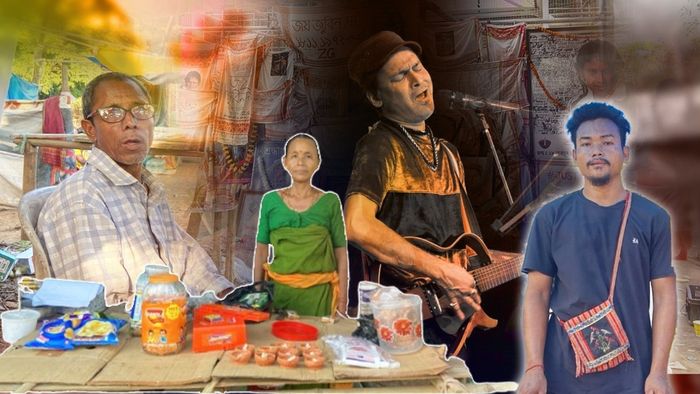Even in death, 'Zubeen da' is helping people live
The lanes around Zubeen da’s cremation site are no longer just paths to a resting place; they hum with life, laughter, and the soft clinking of tea cups. Every small business, every smiling vendor, reflects the enduring spirit of a man who turned a forgotten corner into a living, breathing tribute.

- Oct 17, 2025,
- Updated Oct 17, 2025, 8:57 PM IST
Around 20 km from Guwahati lies the cremation ground of Zubeen Garg, where he now rests eternally.
Sonapur, once surrounded by silence and stillness, has transformed. What was once a quiet, almost unknown corner for many has now become a bustling hub of small-scale businesses. From tea stalls and flower shops to pan-tamul vendors and souvenir sellers, this place has come alive with the tunes of 'Mayabini Ratir Bukut' all because of one man whose presence continues to resonate long after his passing.
A man who had no god, no religion, and no caste, his cremation ground has turned into a pilgrimage site for people from every walk of life.
Zubeen Garg was a people’s man, no doubt about that. He touched countless lives when he was alive, and even after his passing, he continues to stand with the people in the most unexpected ways.
Take Juna Pathor, a 60-year-old entrepreneur. Yes, entrepreneur, because words like that aren’t reserved only for people visible on the internet. Juna ba started a small shop just outside Zubeen da’s cremation site. Holding back her tears, she said,
“I used to go to Guwahati's Beltola to sell local vegetables. It was tough for me as a woman. But now I’ve set up a small shop here, and Zubeen da is helping me run my family. Many come here daily to pay tribute and buy pan-tamul (betel nut and leaves) from me. I don’t think he’s gone, he’s still here with us, helping us just the way he did when he was alive.”
While strolling through the lanes near the cremation site, we met another young man in the crowd, Indrajit Imjal, who had set up a small stall there.
“I used to be a daily wage labourer, but now I have my own stall here. Zubeen da is my god and he’s watching over us,” he said.
There are countless stories like Juna ba’s and Indrajit’s.
Another individual who caught our eye was 70-year-old Binod Rai, wearing a high-powered lens, possibly suffering from hypermetropia, who told us how this place was once known only for its shamshan ghat and the highway.
“Zubeen Garg has given us a new identity,” he said. “Sonapur is now forever attached to Zubeen da’s name.”
Whether people ever met Zubeen Garg or not, and no matter how many days have passed since his demise, they continue to arrive in large numbers at Sonapur to pay their respects. The love for Zubeen da is not only keeping his memory alive, it’s reviving the economy of Sonapur, creating livelihoods for many who once struggled to make ends meet.
In a state often divided by religion and community, by Hindu, Muslim, or the question of who owns the land, only Zubeen Garg could bring everyone together. From chants of kirtan to the Arabic pronunciation of dua, to blessings from the holy lord, millions came together, transcending politics, religion, and identity. Only Zubeen Garg could pull this off. And he did.
Once, Zubeen Garg said —
“Assam is famous for three things: Tea, Rhinos, and Zubeen Garg.”
And yes, it’s true.